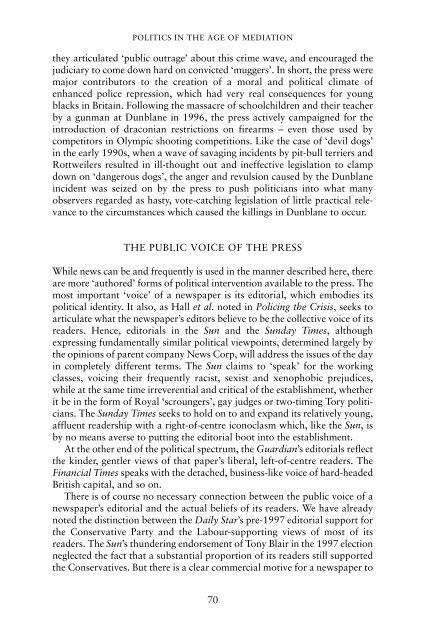20130412164339753295_book_an-introduction-to-political-communication
20130412164339753295_book_an-introduction-to-political-communication
20130412164339753295_book_an-introduction-to-political-communication
Create successful ePaper yourself
Turn your PDF publications into a flip-book with our unique Google optimized e-Paper software.
POLITICS IN THE AGE OF MEDIATION<br />
they articulated ‘public outrage’ about this crime wave, <strong>an</strong>d encouraged the<br />
judiciary <strong>to</strong> come down hard on convicted ‘muggers’. In short, the press were<br />
major contribu<strong>to</strong>rs <strong>to</strong> the creation of a moral <strong>an</strong>d <strong>political</strong> climate of<br />
enh<strong>an</strong>ced police repression, which had very real consequences for young<br />
blacks in Britain. Following the massacre of schoolchildren <strong>an</strong>d their teacher<br />
by a gunm<strong>an</strong> at Dunbl<strong>an</strong>e in 1996, the press actively campaigned for the<br />
<strong>introduction</strong> of draconi<strong>an</strong> restrictions on firearms – even those used by<br />
competi<strong>to</strong>rs in Olympic shooting competitions. Like the case of ‘devil dogs’<br />
in the early 1990s, when a wave of savaging incidents by pit-bull terriers <strong>an</strong>d<br />
Rottweilers resulted in ill-thought out <strong>an</strong>d ineffective legislation <strong>to</strong> clamp<br />
down on ‘d<strong>an</strong>gerous dogs’, the <strong>an</strong>ger <strong>an</strong>d revulsion caused by the Dunbl<strong>an</strong>e<br />
incident was seized on by the press <strong>to</strong> push politici<strong>an</strong>s in<strong>to</strong> what m<strong>an</strong>y<br />
observers regarded as hasty, vote-catching legislation of little practical relev<strong>an</strong>ce<br />
<strong>to</strong> the circumst<strong>an</strong>ces which caused the killings in Dunbl<strong>an</strong>e <strong>to</strong> occur.<br />
THE PUBLIC VOICE OF THE PRESS<br />
While news c<strong>an</strong> be <strong>an</strong>d frequently is used in the m<strong>an</strong>ner described here, there<br />
are more ‘authored’ forms of <strong>political</strong> intervention available <strong>to</strong> the press. The<br />
most import<strong>an</strong>t ‘voice’ of a newspaper is its edi<strong>to</strong>rial, which embodies its<br />
<strong>political</strong> identity. It also, as Hall et al. noted in Policing the Crisis, seeks <strong>to</strong><br />
articulate what the newspaper’s edi<strong>to</strong>rs believe <strong>to</strong> be the collective voice of its<br />
readers. Hence, edi<strong>to</strong>rials in the Sun <strong>an</strong>d the Sunday Times, although<br />
expressing fundamentally similar <strong>political</strong> viewpoints, determined largely by<br />
the opinions of parent comp<strong>an</strong>y News Corp, will address the issues of the day<br />
in completely different terms. The Sun claims <strong>to</strong> ‘speak’ for the working<br />
classes, voicing their frequently racist, sexist <strong>an</strong>d xenophobic prejudices,<br />
while at the same time irreverential <strong>an</strong>d critical of the establishment, whether<br />
it be in the form of Royal ‘scroungers’, gay judges or two-timing Tory politici<strong>an</strong>s.<br />
The Sunday Times seeks <strong>to</strong> hold on <strong>to</strong> <strong>an</strong>d exp<strong>an</strong>d its relatively young,<br />
affluent readership with a right-of-centre iconoclasm which, like the Sun, is<br />
by no me<strong>an</strong>s averse <strong>to</strong> putting the edi<strong>to</strong>rial boot in<strong>to</strong> the establishment.<br />
At the other end of the <strong>political</strong> spectrum, the Guardi<strong>an</strong>’s edi<strong>to</strong>rials reflect<br />
the kinder, gentler views of that paper’s liberal, left-of-centre readers. The<br />
Fin<strong>an</strong>cial Times speaks with the detached, business-like voice of hard-headed<br />
British capital, <strong>an</strong>d so on.<br />
There is of course no necessary connection between the public voice of a<br />
newspaper’s edi<strong>to</strong>rial <strong>an</strong>d the actual beliefs of its readers. We have already<br />
noted the distinction between the Daily Star’s pre-1997 edi<strong>to</strong>rial support for<br />
the Conservative Party <strong>an</strong>d the Labour-supporting views of most of its<br />
readers. The Sun’s thundering endorsement of Tony Blair in the 1997 election<br />
neglected the fact that a subst<strong>an</strong>tial proportion of its readers still supported<br />
the Conservatives. But there is a clear commercial motive for a newspaper <strong>to</strong><br />
70
















